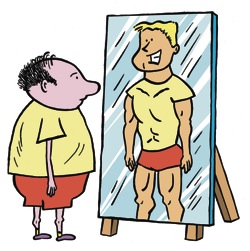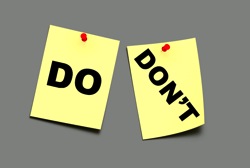Guilty As Charged
 I know I’ve written about guilt before and there’s a good chance I may say the exact same thing again now. Chalk it up to a phrase my grandson has become fond of: “Doddering old fool.”
I know I’ve written about guilt before and there’s a good chance I may say the exact same thing again now. Chalk it up to a phrase my grandson has become fond of: “Doddering old fool.”
Guilt is easy to induce; just judge a past thought or deed by a current level of awareness and POOF you have guilt.
So it’s the judgement (thinking guilty) that has us feel the emotion known as guilt.
It’s helpful to have a couple of definitions of emotion to make the point. Both come from people who are tapped in to their spiritual side a bit more than the average bear – Eckhart Tolle and Jerry Stocking.
Tolle defines emotion this way: “Emotion: The body’s reaction to your mind.”
Jerry says it this way: “Emotion results when your illusion runs into reality.”
Both are, in effect, supporting the notion that thinking guilty produces feeling guilty. Your body produces emotion when your mind, which is chock full with illusionary thoughts, runs into the buzz saw known as reality.
The best example I can give for producing the self destructive emotion known as guilt is this: A parent comes home from a trying day at work and finds the children doing the exact same stuff they did when the day wasn’t so trying. He or she reacts poorly this time and berates the children for behavior that really needs no admonishment. It’s just kids being kids. We’ve all had our version of this reaction.
Fast forward to 15 minutes later when you are less reactionary and you get the gift of awareness that you reacted poorly just minutes ago. You begin to feel guilty – judging a past action by a present level of awareness. How constructive is that?
It’s much more useful for all concerned for you to notice the slippery slope you’re about to go on and skip the guilt by addressing your behavior. “Hey kids, sorry I yelled. It was nothing you did; it was my fault. Sorry if I upset you.”
Guilt is the modern day sack cloth. We wear it as a punishment – one that’s self induced.
Best as I can tell, guilt’s only outcome is to make you feel worse. Now if feeling worse causes you to change your behavior, I’m all in. My experience is that guilt rarely does that; it just produces more guilt.
Here’s my claim: You’ll feel less guilty when you become more responsible for your behavior and own up to it. When you skip the guilt, you can more quickly comfort offended souls rather than rake yourself over the coals.
All the best,
John
Be Sociable, Share!

 Perhaps it’s different for you but I feel more sadness when I compare what I had to what I don’t have now. It seems like a secret formula for sadness is to revisit a moment and pretend it hasn’t passed.
Perhaps it’s different for you but I feel more sadness when I compare what I had to what I don’t have now. It seems like a secret formula for sadness is to revisit a moment and pretend it hasn’t passed. There’s a distinction that occurred to me recently: There’s a difference between planning and being where you’re not. I will now attempt to flesh it out.
There’s a distinction that occurred to me recently: There’s a difference between planning and being where you’re not. I will now attempt to flesh it out. The Grasshopper woke me up with this: “You spend most of your waking hours asleep.”
The Grasshopper woke me up with this: “You spend most of your waking hours asleep.” Many people I meet are members of the “Evil is out there” club. These folks also have another label affixed to themselves – “Victim.”
Many people I meet are members of the “Evil is out there” club. These folks also have another label affixed to themselves – “Victim.” I was taught by the good nuns at Our Lady of Perpetual Help School that God was all knowing and everywhere. We were encouraged to be Godlike.
I was taught by the good nuns at Our Lady of Perpetual Help School that God was all knowing and everywhere. We were encouraged to be Godlike. What level of relationship do you have with another? There are many levels to pick from, ranging from casual to canoodle and everything in between.
What level of relationship do you have with another? There are many levels to pick from, ranging from casual to canoodle and everything in between. Light sources come and go as do people in our lives. When their power source moves on, we can no longer depend on their light to show us their particular way. Their human light, as beautiful as it was, was temporarily housed.
Light sources come and go as do people in our lives. When their power source moves on, we can no longer depend on their light to show us their particular way. Their human light, as beautiful as it was, was temporarily housed. The Grasshopper asked this yesterday: “Who are you without your story?“ It’s not the first time I’ve been asked that question but it’s worth my reflection again.
The Grasshopper asked this yesterday: “Who are you without your story?“ It’s not the first time I’ve been asked that question but it’s worth my reflection again. Most of us believe in the old axiom: “You don’t get a second chance to make a first impression,” so we rarely have a plan in place if we do get a second chance.
Most of us believe in the old axiom: “You don’t get a second chance to make a first impression,” so we rarely have a plan in place if we do get a second chance.